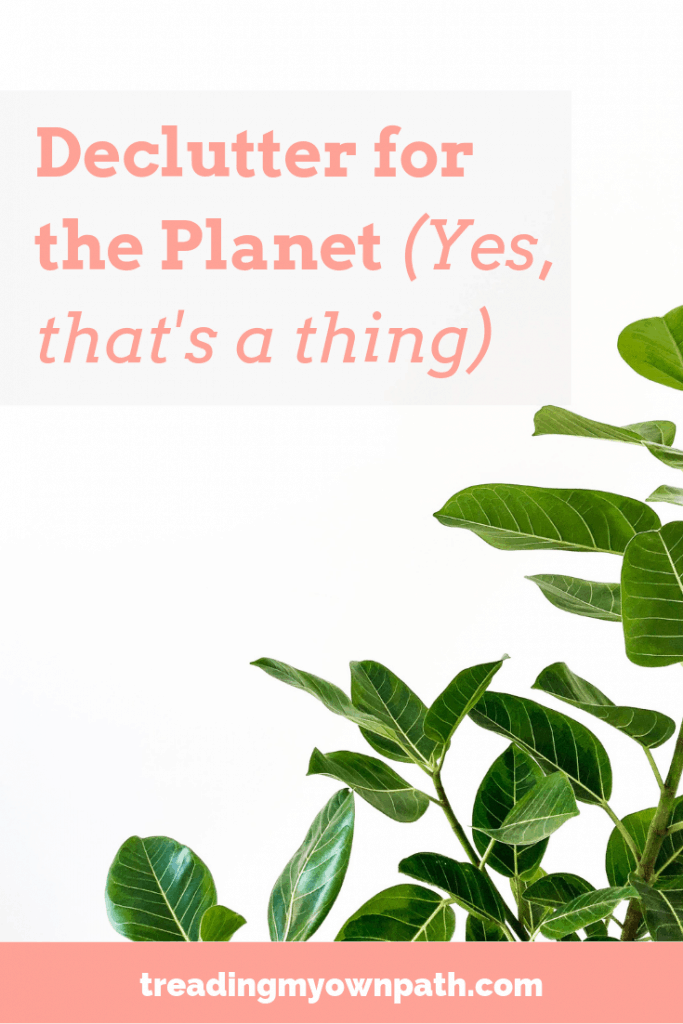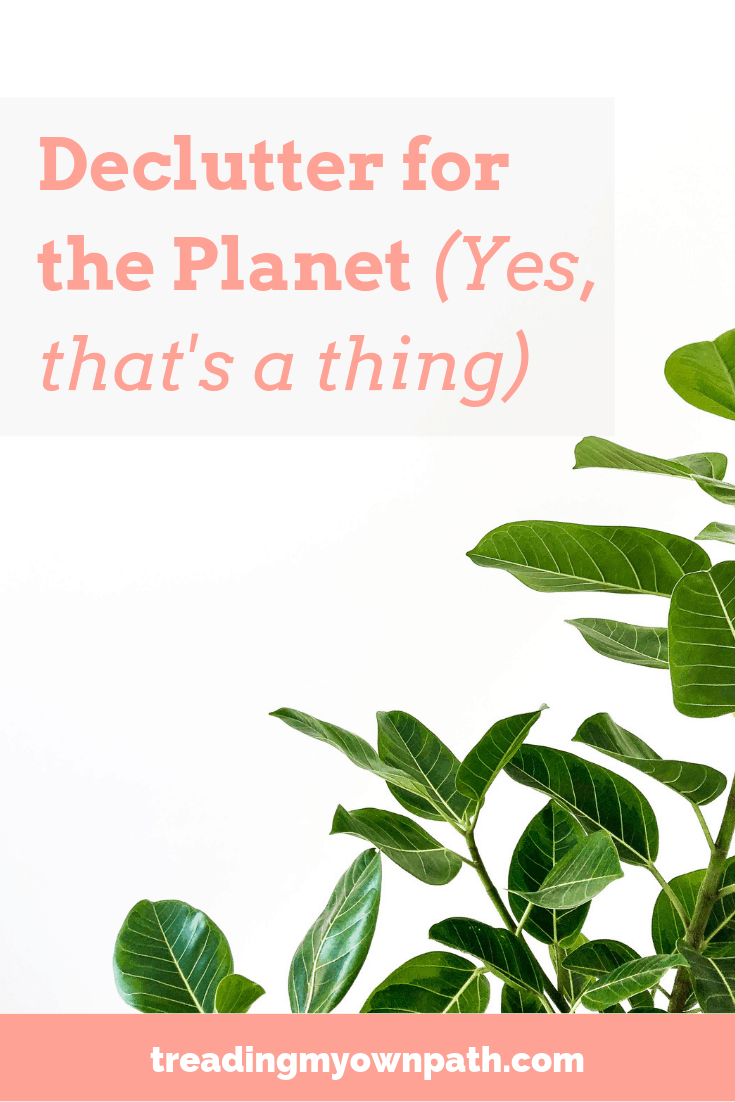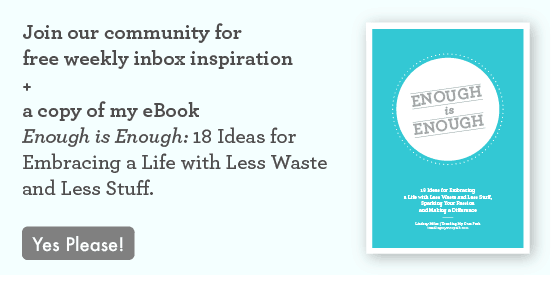Declutter for the Planet (Yes, That’s a Thing)
This week (on July 29th) was Earth Overshoot Day. What this means is that July 29th is the day on which we’ve officially used up all of the resources the planet can naturally regenerate in a year. Another way of saying it, is that we use almost twice as many resources as is sustainable – half of what we use is basically being taken from future generations.
Something to tell the grandkids! Oh…wait…
The Global Footprint Network, who are behind all the research, break it down a little further, detailing the Overshoot Day for each country (meaning, on what day would we use up all the earth’s resources if everyone in the world lived like the people of that country). As you can imagine, Australia, Canada, the US and the UK all fare pretty badly here (the dates are, in order: March 31st, March 18th, March 15th and May 17th).
They also have a little calculator that gives us an idea of what our individual footprint is – how many earths do we need to sustain our current lifestyle?
I gave it a go. It was an interesting exercise, but I don’t actually want to talk about results and how planets we each use (or not). Anything that asks us to self-report our behaviour tends to be overestimated – after all, we like to think the best of ourselves!
What was noticeable to me were the questions that weren’t asked.
There were questions on meat consumption, food miles, food packaging. There were questions on housing and energy use. Of course, there were questions on car driving and flying.
But the glaringly obvious thing missing in my mind were the questions about consuming, shopping and ‘stuff’. Those things have an impact too. Take clothing. The UN estimates that the global fashion industry contributes 10% of greenhouse gas emissions.
(I understand that calculators need to simplify, but still.)
There were no questions about how often we shop, what things we buy, what kinds of businesses we buy from, how the things we buy are delivered (do we buy the from local stores or get them air freighted from different continents?), whether we actually use these things once we own them, and what we do with them when we are done.
If you’ve bought anything ever, and you’re feeling like you should probably get ready to defend your purchasing choices, I just want to say – me too! I’ve bought things too! This is not that post.
Sure, our shopping choices are important. But for me, what’s equally as important is what we do with these things once we buy them. I sometimes think that we forget that our ‘stuff’ is resources. We can put those resources to good use, either ourselves or by giving them to someone else that will use them… or we can leave them languish in a cupboard.
When I think about my footprint, I’m always drawn to the things I own, and whether me owning them is really the best use of that ‘stuff’. I think that letting go of things we no longer use is the opposite of waste. In fact, the idea of Earth Overshoot Day was something I wrote about in my book Less Stuff and one of my personal motivations for decluttering.
I’m not talking about decluttering as overloading the charity shop with stuff they probably won’t be able to sell. I’m not talking about decluttering as clearing space so there’s room to go buy more stuff.
I’m talking about decluttering as de-owning.

I don’t need to own more clothes and shoes than there are days of the year. I don’t need to own every trinket I consider beautiful, or every piece of art I admire. I don’t need to own every single gadget that’s cleverly designed.
I don’t need to own every single thing I might ever need to use just one time.
What I need and what you need will be completely different. But we can both ask ourselves: do I really need this, am I actually going to use it, or can I put it back out into the world and let someone else benefit? Is there a better use for these resources than gathering dust in my cupboards?
Decluttering is as simple as taking a single item, realising that we just don’t use it enough to justify keeping it, and setting about finding somebody who does need it, and will use it.
If you think the ‘finding somebody who does need it’ part sounds hard, it is much simpler than you think, especially with the internet. Think online classifieds, online auction sites, online marketplace platforms, and Buy Nothing groups. For more details, here are six ideas to get you started.
The best thing about sharing stuff is that it is accessible to everybody. We can’t say that about a lot of sustainable choices. Rather than feeling bad because our sole local grocery store wraps everything in plastic, or because we can’t afford solar panels (or we rent), or because we have to drive a car to work because there is no public transport option, we can look at where we have the opportunity to create change and make a difference.
And yes, what you do does make a difference.
When it comes to stuff, I think most of us buy things with good intentions. But the way we use them doesn’t always pan out the way we expect. We can make the most of our bad decisions by ensuring that the things we don’t need don’t go to waste.
And in doing so, we help someone else out, keep resources in circulation and stop new things being made. The best thing of all? It’s easy to do, and you can start taking action today.
Now I’d love to hear from you! Have you heard of Earth Overshoot Day? What steps do you take to share resources? How do you feel about decluttering? How have your feelings changed over time? Any other thoughts to add? Please share below!








There were so many obscure things in my mother’s house when we cleared it out, in June. Some were so random I thought I’d never be able to re-home them.
But – surprise! – today, I just did! My grandfather’s brass and wood pump-action flysprayer and his orchard sprayer (also brass and wood and rubber hose) were all given away to a Heritage Tools collectors’ club. Who knew such clubs existed?
So pleased they’ve gone to new homes, and not to landfill.
It took me a long time to find new homes for other things, too. But that’s another story.
People collect all manner of things – even things that aren’t working, or functional. And then, there are also Repair Cafes, if you want to get things fixed.
Not everyone thinks this way, but you, Lindsay, are in the vanguard, helping us all change our thinking. Thank you!
Thanks for sharing Debbie! I bet that club were really pleased to get those tools, and it feels so good to give things to people who actually want them! Hurrah for sharing stuff :)
Hi! Great article! I agree in every aspect but I think we should start mentioning the footprint that bringing more people into the world creates. I know it’s a delicate subject but I feel we can’t afford not talking about it anymore. Not having children, or choosing to adopt, is one of the most direct ways to reduce our impact in the planet.
Thanks for the work you do! Greetings from Brussels!
Population is a very important point, though lifestyle/consumption choices are also extremely important: Australia doesn’t have one of the highest populations in the world (the population is actually decreasing, with the average family under two children) but Australia has an extremely high environmental impact. If we all lived like Indian families, perhaps we wouldn’t be overshooting the earth’s resources, but would the population still be increasing? And how many people would there be on the planet now if China has not introduced its one-child policy?
It was interesting to hear Prince Harry and his wife announce that they are going to have no more than two children, for the sake of the environment. I think they are making a difference with that choice.
Hi Julia and thanks for sharing. Yes, it’s definitely not simple. I know plenty of people with children that do so much to reduce their footprint: buying second-hand, keeping consumption to a minimum, eating a vegetarian/vegan diet etc etc… and then people who are childless that eat meat, fly often, buy stuff. I often think Australia gets away with more than they should on these comparison charts because overall emissions are lower due to a small population – but as you say, we’re almost as high as the US in our consumption habits! More than 4 planets per person is not sustainable, and not equitable. I know I say it all the time, but if we all just do what we can, we can make so much difference :)
Australia’s population is increasing according to Wikipedia:
https://en.wikipedia.org/wiki/Demography_of_Australia
Hi Malena, thanks so much for your comment! That is of course a very salient point, however it’s a tricky one to talk about because these decisions for most people aren’t based on scientific data but feelings, instinct, hormones, culture, society, desires… It’s also not something that once done can be undone! Maybe one day I will broach it on the blog, who knows…
Great post. Yes I had heard of Earth Overshoot. I think it’s going to become more and more known about, helping us see we truly need to make a difference.
One of the main things I don’t buy new anymore is clothing for 2 of my children. I look for bundles of clothes for sale on Gumtree and it costs hardly anything for a heap of great clothes in the size I need. I know I’m doing good for our planet and it’s amazing to save money too.
Love it Belinda! Kids grow so fast there must so much great quality clothing out there that’s barely used. And second-hand almost always means we can afford better quality which is a double win. Hurrah for sharing and re-cycling resources! :)
Lindsay you are the best! No, I had not heard of Earth Overshoot Day – another new thing I’ve learned from you. Thanks.
Hurrah! ;) Thanks Emilie. Always so much to learn! (Me included!)
Another amazing read, full of ideas and inspiration. I only read about Earth Overshoot Day from your email, and the calculator does indeed seem too simple, although they are seeking donations to keep it going and improve it, so maybe in the future it will become more complex.
Im thinking they may be keeping it simple to encourage more people to use it, since a lot of people are time poor these days, with the current government completely screwing the economy and messing with wages and penalty rates.
Fantastic article thank you Lindsay. Your passion for the environment resonates in your writing xxx love your work. We need more Lindsays in this world!!